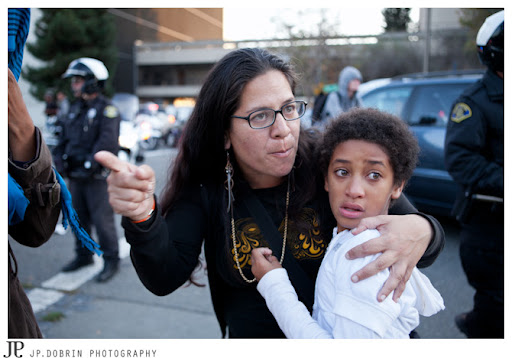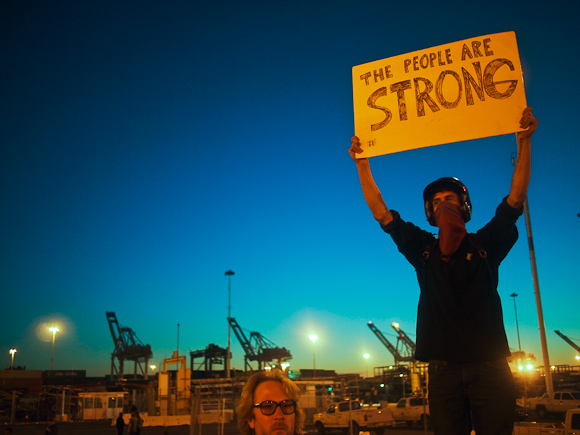United States
Photo essay: 11-11-11 -- Veterans for Peace Arlington West Memorial: 8 years and counting

Photos and text by James Rodríguez, Santa Monica, Los Angeles County, California
November 11, 2011 -- Mimundo.org, posted at Links International Journal of Socialist Renewal with James Rodríguez's permission -- The armistice that ended World War I was signed on November 11, 1918. Since then, many allied nations have adopted the date to commemorate members of the armed forces who have served in a war. In the United States, this day is observed as Veterans Day.
This year’s holiday marks the eight anniversary of a unique commemoration carried out by the Los Angeles chapter of Veterans for Peace (VFP) on the sands of world-renowned Santa Monica Beach. Every Sunday since Veterans Day 2003, numerous VFP members and volunteers have erected a temporary and symbolic cemetery aptly named Arlington West Memorial. White crosses represent one fallen Iraq or Afghanistan war veteran, while red crosses represent 10 US servicepeople killed in action in these two wars.
Martin Hart-Landsberg: Yes, Virginia, there is a 1%

For more on the Occupy movement, click HERE.
By Martin Hart-Landsberg
October 24-November 7, 2011 -- Reports from the Economic Front, posted at Links International Journal of Socialist Renewal with permission -- The Occupy Wall Street movement has succeed in forcing the media to acknowledge the extent and seriousness of income inequality. In many ways wealth inequality is a bigger problem, since it is wealth that largely underpins income and power differences.
According to an Economic Policy Institute posting,
the richest 5 percent of households obtained roughly 82 percent of all the nation’s gains in wealth between 1983 and 2009. The bottom 60 per cent of households actually had less wealth in 2009 than in 1983, meaning they did not participate at all in the growth of wealth over this period.
It is worth dividing the top 5% into what has now become two familiar groups, the top 1% and the next 4%.
'Build a future which reflects our dreams' -- Angela Davis addresses Occupy Wall Street
Author, activist and member of the Committees of Correspondence (former Communist Party USA) Angela Davis spoke at Occupy Wall Street in Washington Square Park, New York City, on Sunday, October 30, 2011. See video of her Q&Aperiod below.
"We say no to big banks. We say no to corporate executives making millions of dollars a year. We say no to student debt, we say no to evictions. We say no to global capitalism. We say no to the prison industrial complex. We say no to racism, we say no to class exploitation, we say no to homophobia, we say no to transphobia, we say no to ableism. We say no to military occupation. We say no to war ...
For more reports on the Occupy movement, click HERE.
Alternet -- Angela Davis, professor, thinker, activist, famed revolutionary, visited New York's Occupy Wall Street movement on Sunday afternoon. She spoke first to a densely packed crowd seated on cold concrete at Washington Square Park, her talk over the People's Mic sounding like a litany.
Graphic eyewitness photo essay: Police attack Occupy Oakland

For more reports on the Occupy movement, click HERE.
Photographs by Jean-Philipe Dobrin, Oakland, California
October 25, 2011 -- Posted at Links International Journal of Socialist Renewal with the photographer's express permission. Unauthorised use of images is not permitted. Please contact jp@jpdobrin.com before using images. All images ©jpdobrin.com -- Hundreds of police staged a pre-dawn raid on the Occupy Oakland encampment in the city's main square October 25, firing tear gas, beanbag rounds and rubber bullets, and arresting at least 85 protesters, reported Socialist Worker's
Occupy! More reports from the frontline: Wellington, Dublin, Canada, US cities
Nati at Occupy Wellington.
[Are you a participant in an Occupy action in your city or town? Please leave a report in the comments section below. For more activist reports on the Occupy movement, click HERE.]
Occupy Wellington
By Grant Brookes
October 20, 2011 -- UNITYblog
“Why are they protesting?” ask the baffled pundits on TV. Meanwhile, the rest of the world asks: “What took you so long?” -- Naomi Klein
With comments like this, campaigning journalist Naomi Klein has captured the essence of the mushrooming movement against corporate greed which began on Wall Street. The movement is expressing the feelings of a global majority denied a voice in the media and in the corridors of power.
It spread to Aotearoa on October 15, when occupations began in Auckland, Wellington, Christchuch, Dunedin, New Plymouth and elsewhere.
Photo essay: World Food Day protest at Monsanto's world headquarters
.jpg)
Photos by Don Fitz and Barbara Chicherio
October 17, 2011 -- Links International Journal of Socialist Renewal -- It ain’t easy organising anti-Monsanto pickets in St. Louis, where it seems that every other person has a relative, neighbour or friend who works for the corporate demon and is worried about its retaliation. Nevertheless, the Gateway Green Alliance and Safe Food Action St. Louis planned a demonstration as part of the October 16, 2011, World Food Day and Millions Against Monsanto nationwide events put together by the Organic Consumers Association.
Several dozen activists fighting the company’s efforts to force GMOs (genetically modified organisms) on everyone who eats food, as well as its attempt to destroy small farmers in the US and across the globe, met at the Monsanto's world headquarters on the afternoon of October 16. Soon we were joined by a couple of carloads from Occupy St. Louis and had a lively group of 50.
A big problem with picketing Monsanto’s headquarters is that Olive Boulavard traffic whizzes by at 40–50 miles per hour, meaning that drivers can’t read a sign with small or thin letters. But several of us remembered the old Burma Shave signs on two-lane highways.These are photos of the picket.
Occupy Sydney, October 15, 2011. Photos by Kate Ausburn.
October 16 , 2011 -- Links International Journal of Socialist Renewal -- According to http://15october.net, protests and actions -- inspired by the Occupy Wall Street mass movement across the United States -- were to take place in more than 950 cities in more than 80 countries on October 15. Actions had already begun in some parts of the world before that.

